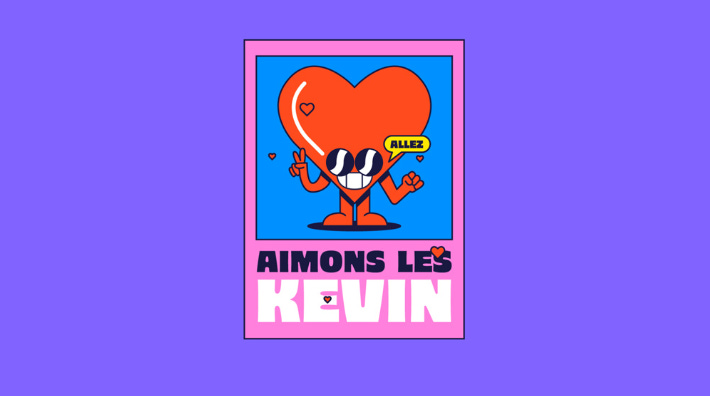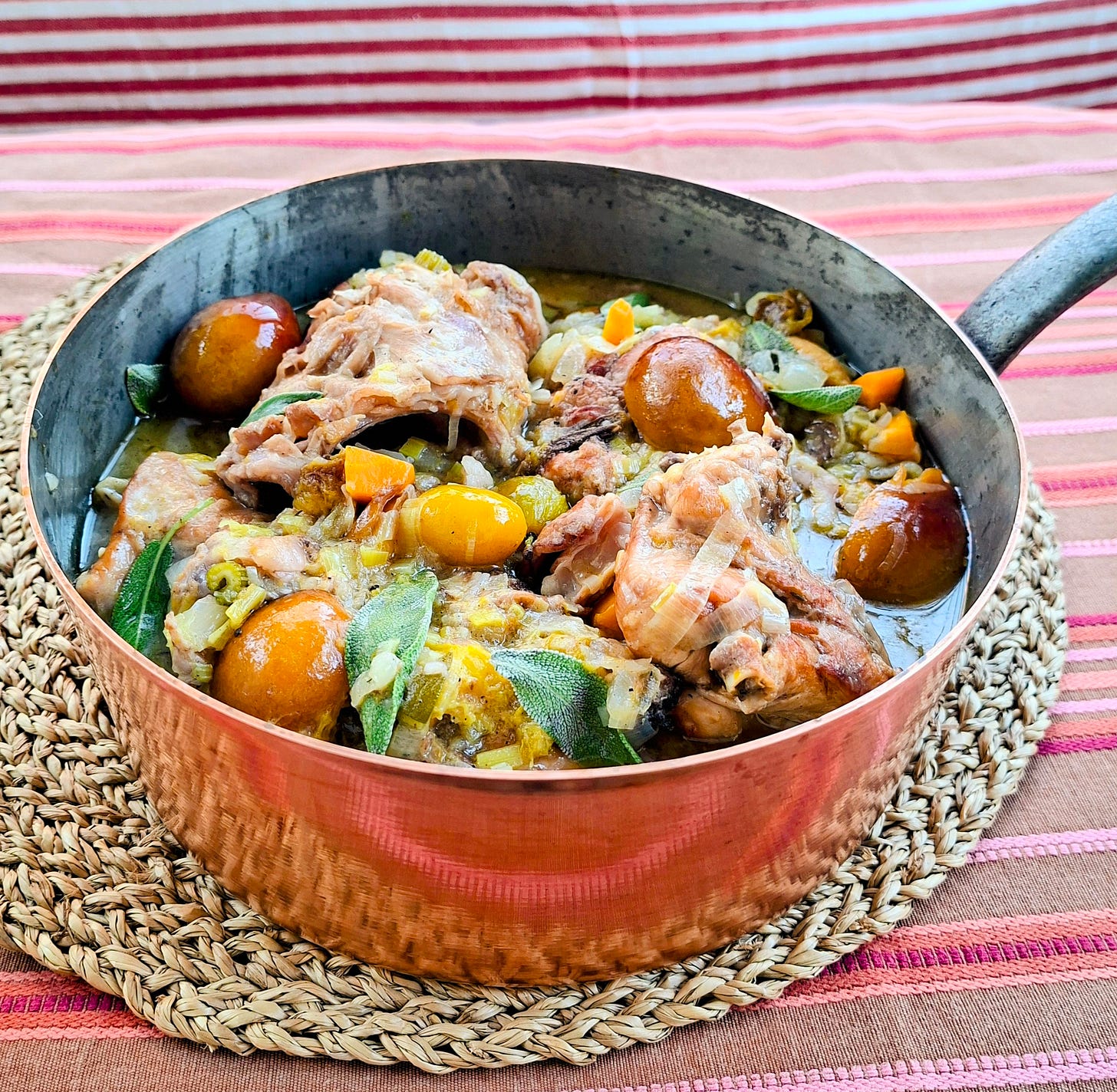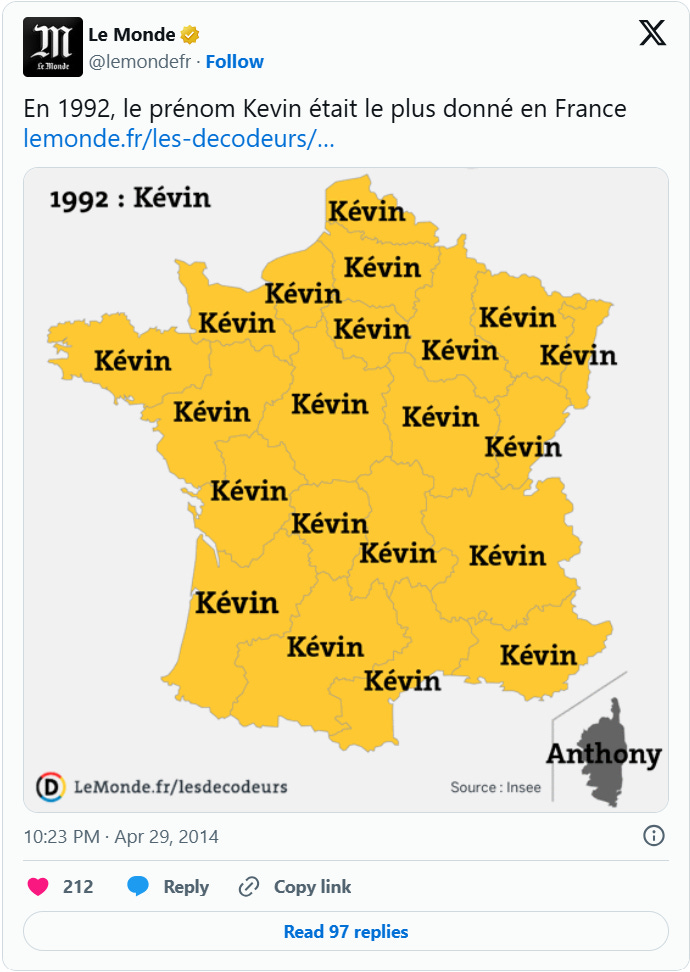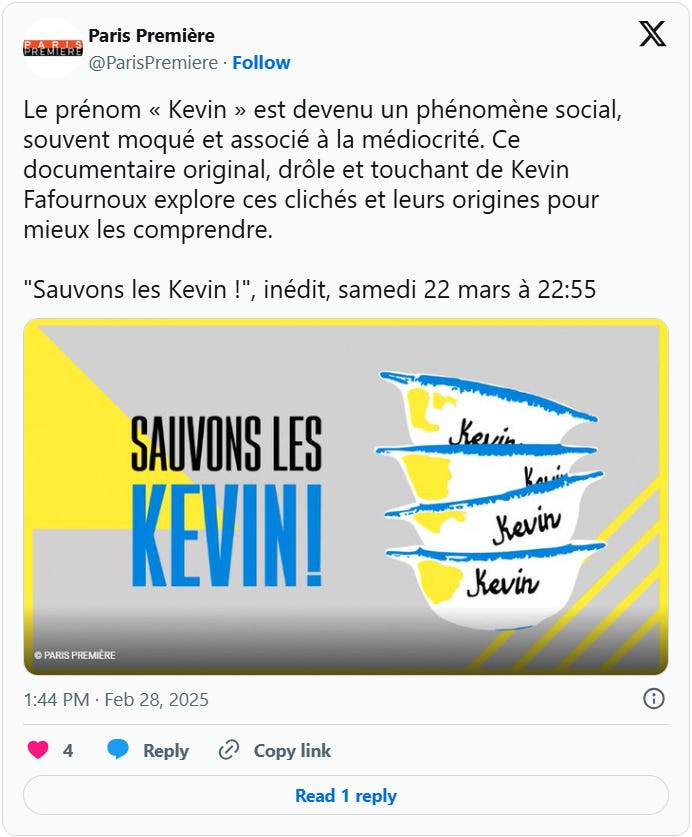We need to talk about Kevins
This week, why 2,700 French men called Kevin apply to change their names every year, plus a wonderful turn-of-the-season casserole and a make-ahead menu
I’ve been thinking about names a lot recently. In October, we’re getting a puppy and once again the heavy mantle of naming a sentient creature falls upon my shoulders. I scribble down suitable dog names in notebooks and tap them into my phone. Naming dogs – or people – in a foreign country is fraught because names are so resonant, so loaded, such tricky class indicators. You can go terribly wrong. You pick something you think sounds adorable, something you can imagine yourself shouting across the park for the next dozen or so years, and then you discover it’s the name of one of France’s most notorious serial killers or scoundrels.
I was thinking about names and noodling about on Instagram when I came across a something by Madame Tartempion, an American woman who has lived in Paris for the past ten years and often makes amusing and interesting posts about living here. She was talking about Kevins. I had wondered why there seemed to be so many of them, and she gave me my answer.
In 1993, the law changed so that parents weren’t restricted to a list of traditional French names for their babies and the freedom to call their children more or less what they wanted, of no longer being restricted by the names of saints and statesmen, meant they all lost their baby-naming minds for a while.
Think back to the early nineties, when we all still went to the cinema or at least walked to Blockbuster for our movie fix. We started off the decade strong in 1990 with Home Alone, where Macaulay Culkin’s character in is called Kevin. Then there was Kevin Costner, possibly the movie star of that era, who never gave us a moment’s peace from his acting, with Dances With Wolves, 1990, Robin Hood: Prince of Thieves, 1991, andThe Bodyguard 1992. And perhaps we should underestimate the invaluable work done in preparing the path for these Kevins by footballer, Kevin Keegan. The curly-haired scamp won the Ballon d’Or, the European Footballer of the Year, in 1978 and 1979, and in football-mad France, this made an impression. In 1994, 14,000 French babies were named Kevin.
Kevins are often the butt of jokes in popular culture. Comedian Élie Semoun even invented a female version, Kévina, rather like Harry Enfield and Kathy Burke’s comic creations, Wayne and Waynetta Slob.
Now these Nineties babies are all in their thirties and, for some of them, they’ve lived to regret their parents’ folly. At best, some think it doesn’t bestow the kind of gravitas they would like at work, and at worst they fear they have become a joke.
Research in social exclusion found that job applicants named Kevin are ten to thirty per cent less likely to be hired than someone named Benoit or Louis, despite having equivalent experience and qualifications. Some Kevins have had enough. More than 2,700 of them apply to change their names legally each year.
An article in France-Amerique, the (hopefully, temporarily) shuttered bilingual publication quotes sociology professor ay the École normale supérieure in Paris, Baptiste Coulement, who believes the boom in Kevins embodied the “cultural emancipation of the popular classes” from the elite.
In an interview with Radio France, Coulement said: “Kevin is a name that was born and died among the working classes, given mainly by working-class parents, and very rarely by the Parisian professional classes or aristocrats…The traditional model before 1945 was one with a very vertical transmission of names, which originated at the top of the social ladder and ended up at the bottom.” He said mockery of Kevins often comes from “The intellectual bourgeoisie, for whom this name embodies bad taste.”

Kevins are often the butt of jokes in popular culture. Comedian Élie Semoun even invented a female version, Kévina, rather like Harry Enfield and Kathy Burke’s comic creations, Wayne and Waynetta Slob.
The same snobbish mockery applies to people with any of the “new” names drawn from popular culture. Please remember in your prayers the Cyndis, Jennifers, Jordans, Dylans and Brandons. But it is certainly the Kevins who are the most vocal, who have stepped up to defend the dignity of them all.
In March this year, Parisian director Kevin Fafournoux launched his film Sauvons les Kevin. He crowd funded enough money to make the film in two days. The Kevins had had enough. He interviewed two hundred of them, including a psychologist who worried about having his name on his door plaque for fear of losing professional credibility, and a lawyer who expressed similar concerns. Many said they believed their name made it more difficult for them to get jobs and girlfriends. He interviewed his parents (his mum, Bernadette, just liked the name). He travelled to Ireland in the footsteps of St Kevin, and assembled rappers, comedians and DJs all called Kevin for a Kevin night of joy and self-acceptance. He even gave a Ted Talk to 500 people. Finally, he even meets the man largely responsible for it all, Kevin Costner. Fafournoux said, “La boucle est bouclée”. The loop is closed.
Curiously, this anti-Kevin mockery is not exclusive to France. The Germans are at it too. In 1991, Kevin was the most popular name for baby boys in Germany. Today, Kevinismus is the popular term for the trend of giving boys newly-fashionable names, rather than traditional ones; Chantalismus is the female equivalent. “Du bist ein Kevin” means “You’re a bit dim”. You can even buy “Du bist ein Kevin” T-shirts, the German equivalent of “I’m with stupid”
This is a really, really long way of saying, if you have any idea for great, un-embarrassing, names for a female puppy that work in two languages, hit me up. Merci.
You’re going to need some nourishment after all that, so do try this week’s recipe for Lapin aux mirabelles, rabbit with plums, along with the easy, stress-free, feed-a-crowd menu to go with it. If rabbit’s not your thing, it’s tip top made with chicken thighs too.
Lapin aux mirabelles
Rabbit with plums
Our market is full of beautiful plums right now – golden mirabelles and charteuse reine-claudes, perfumed violet quetsches and purple-black stanleys, the ones often dried to create pruneaux d’Agen. I can’t resist them, but there’s only so much jam I can make, tarts I can bake, or compote I can poach to go with my breakfast yoghurt. Well – and thank goodness – plums are wonderful in many savoury dishes too, such as today’s rabbit casserole. I intended to make it just with mirabelles, but the stanleys were so perfect I threw some of those in there too – I love the gold and the purple together.
If you can’t find rabbit, or you don’t care for it, you can make exactly the same dish using bone-in chicken thighs and it will be delicious. You can also make it up to a day ahead and it freezes brilliantly. If you’re feeding a crowd, you can double or triple it up very easily, too.
Keep reading with a 7-day free trial
Subscribe to Lickedspoon with Debora Robertson to keep reading this post and get 7 days of free access to the full post archives.





